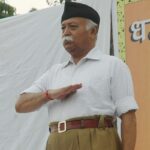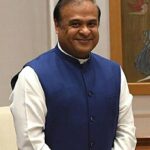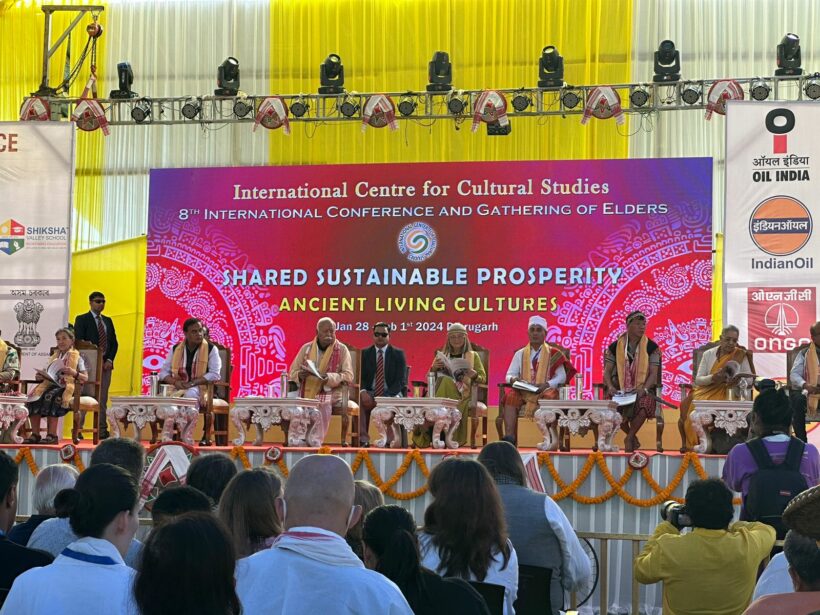UN Admitted the Importance of Cultural Integration in Development Policies: RSS Chief Bhagwat
Guwahati, India: The 8th triennial conference of elders of ancient traditions and cultures under the auspices of the International Centre for Cultural Studies (ICCS) begins on a colorful note at Dibrugarh of Assam in northeast India on 28 January 2024. Rashtriya Swayamsevak Sangh’s Sarsanghchalak Mohan Bhagwat, Assam chief minister Himanta Biswa Sarma, and spiritual leaders from 33 countries graced the occasion. The five-day conference will witness the deliberations by spiritual leaders to prepare a roadmap for global peace and prosperity.
A colorful procession with delegates from 33 countries in their traditional attires and fineries accompanying drums and devotional dances by many tribes of the northeastern region traversed through the streets of Dibrugarh in the morning hours. The graceful inaugural session was presided over by CM Sarma with RSS chief Bhagwat being the keynote speaker. The program began with the lighting of the auspicious lamp, followed by religious prayers of eight representatives of ancient faiths from seven continents.
Welcoming the delegates, Sarma stated that Assam is home to hundreds of indigenous tribes and faiths. He pointed out that in the current intolerant and strife-torn world, indigenous faiths have suffered the
worst, and it is everyone’s duty to nurture them. We must preserve these belief systems as they are deeply committed to the environment, said Sarma, adding that they have been living in harmony with nature from time immemorial.
He mentioned many Assamese tribes and their connection with nature, which form the rich tapestry of ancient beliefs. The saffron leader expressed his pain that these communities have been targets of
conversion, where education and healthcare are used as baits. The erosion of indigenous faiths is deeply worrying as it weakens the society. Sarma gave examples of various tribes across Bharat who have
faced this attack. He recalled how Birsa Munda made it his life’s mission to protect his community from conversions and revive Munda’s faith.
He also quoted Mahatma Gandhi from his book titled ‘Why I Am a Hindu’, where Gandhi said that the demise of a faith is the demise of its wisdom. Sarma informed the audience that his government has formed a separate department for preserving, promoting, and nurturing the indigenous faiths of Assam. Finally, he expressed hope that the conference will help revive indigenous faith and culture and stop the cultural erosion taking place in present-day society.
Sarsanghchalak Bhagwat in his address termed Assam as the land of spirituality. He pointed out that this gathering which came together two decades back was a beginning with promises. He congratulated the
elders of the ancient traditions and cultures for keeping their ancient faiths alive despite the aggressive environment surrounding them. Despite two thousand years of progress and material prosperity, the world is facing conflicts, asserted Bhagwat, adding that there is no peace outside or within.
“Children go to schools with guns and shoot people without any apparent reason. There is envy and ego and there are struggles due to the narrowness of minds where people are divided into ‘us and them, ours
and theirs’. Those who wish to go beyond these groupings and save humanity, end up becoming another group. Leaders and thinkers have been talking about saving the environment, but nothing concrete has
come up except talks,” said Bhagwat.
He noted that many theories and isms came up – from individualism which didn’t consider society important, to communism which considered society as supreme, with no space for individual bliss and social peace. All theories necessarily focused on material prosperity. Religions evolved to find solutions but they too failed. Because they did not look at the integral whole they couldn’t discern the underlying element of oneness that connects all these human dimensions. They could not reach the ancient wisdom of sarve sukhinah santu (let all be happy).
Bhagwat also noted that an individual, the community or society, the nation, and nature are related in a spiral, each leading to the next mechanism. They don’t exist in concentric circles. Factoring this culture can bring peace and prosperity. He pointed out how a United Nations resolution in 1951 talked about scrapping ancient philosophies and the disintegration of old social institutions for one goal of rapid economic progress. “But in 2013, the UN had to admit that integration of culture into development policies was necessary for global development,” commented Bhagwat.
On this occasion, a new academic and research journal was launched by the ICCS that will focus on history, anthropology, and governance. A souvenir with insightful articles and highlights of earlier
conferences was also released. The conference will conclude with the gracious presence of RSS Sarkaryavah Dattatreya Hosabale, Arunachal Pradesh government chief Pema Khandu, ICCS president Shashibala with others on the 31st of January.
 Mohan Madhukar Rao Bhagwat (IAST: Mohan Madhukarrao Bhāgvat, Marathi pronunciation: [moːɦən bʱaːɡʋət̪]; born 11 September 1950) is a political activist and veterinarian who is currently serving as the 6th and current Sarsanghchalak of the Rashtriya Swayamsevak Sangh in India since 2009. https://en.wikipedia.org/wiki/Mohan_Bhagwat
Mohan Madhukar Rao Bhagwat (IAST: Mohan Madhukarrao Bhāgvat, Marathi pronunciation: [moːɦən bʱaːɡʋət̪]; born 11 September 1950) is a political activist and veterinarian who is currently serving as the 6th and current Sarsanghchalak of the Rashtriya Swayamsevak Sangh in India since 2009. https://en.wikipedia.org/wiki/Mohan_Bhagwat
 Himanta Biswa Sarma (born 1 February 1969) is an Indian politician and lawyer serving as the 15th and current Chief Minister of Assam since 2021. A former member of the Indian National Congress, Sarma joined the Bharatiya Janata Party on 23 August 2015 and soon was made convenor of NEDA[1] He is a five-time Member of the Assam Legislative Assembly from Jalukbari, having been elected since 2001. https://en.wikipedia.org/wiki/Himanta_Biswa_Sarma
Himanta Biswa Sarma (born 1 February 1969) is an Indian politician and lawyer serving as the 15th and current Chief Minister of Assam since 2021. A former member of the Indian National Congress, Sarma joined the Bharatiya Janata Party on 23 August 2015 and soon was made convenor of NEDA[1] He is a five-time Member of the Assam Legislative Assembly from Jalukbari, having been elected since 2001. https://en.wikipedia.org/wiki/Himanta_Biswa_Sarma










